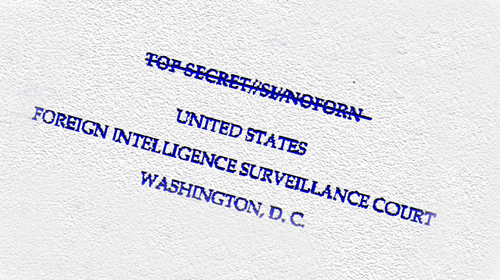
The secret Foreign Intelligence Surveillance Court (FISC) released an opinion yesterday explaining its decision to allow the NSA to collect a record of every single phone call made by every single American every single day.
The program—which we have called the “mass call-tracking program” in —is one of the most sweeping surveillance programs ever approved by a court or instituted in a democracy. And so you might reasonably expect that a judicial justification of the program would require a lengthy opinion explaining in detail how such indiscriminate surveillance can possibly be lawful. Not so—the FISC managed to approve the indefinite tracking of every American’s phone calls in under 30 pages.
There are a lot of reasons to question the court’s reasoning, but I want to focus on the key passage, which is this one:

The principal problem with the court’s explanation in this paragraph is that it has no limit. Imagine replacing the key words—“telephone communications” and “telephone company’s metadata”—with just about any other set of information the government wants to collect, and you’ll be well on your way to justifying pervasive and indiscriminate surveillance of not just our phone records, but our emails, credit-card transactions, medical records, and more. The court's opinion never addresses how far its reasoning might go.
According to the court’s logic, here are just a few examples of what we might expect to see in future opinions if we allow Big Brother to collect Big Data:
- Because known and unknown international terrorist operatives are using email, and because it is necessary to obtain the bulk collection of an email provider’s metadata to determine those connections between known and unknown international terrorist operatives as part of authorized investigations . . . .
- Because known and unknown international terrorist operatives are engaging in financial transactions, and because it is necessary to obtain the bulk collection of a financial institution’s transaction history to determine those connections between known and unknown international terrorist operatives as part of authorized investigations . . . .
- Because known and unknown international terrorist operatives are using the Internet, and because it is necessary to obtain the bulk collection of an internet provider’s usage history to determine those connections between known and unknown international terrorist operatives as part of authorized investigations . . . .
These are not just hypothetical worries. confirms that the NSA did, for years, acquire all of our email records—documenting whom we emailed, who emailed us, and when. The FISC’s latest opinion also drops tantalizing and troubling hints that there might be other so-called “bulk collection” programs. Unfortunately, all the details are redacted:

This should trouble us all for another reason: mission creep. The NSA’s surveillance is not limited to suspected terrorists. In fact, the government defines its “foreign intelligence” mission extraordinarily broadly to include gathering information about “foreign affairs.” And surveillance doesn’t stop with the NSA.
Other agencies have already to the NSA’s vast databases, and there’s little to stop the government from attempting to import the FISC’s sweeping surveillance logic into other areas. I’m sure it would be useful to the FBI in investigating health-care fraud to have every American’s medical records, or in investigating drug conspiracies to have all of our telephony and email metadata, or in investigating illegal gun sales to have a record of every gun sale.
As our private lives become even more digitized, the lure of our data will become irresistible to the intelligence agencies. Historically, we have resisted that Orwellian urge by adhering to two key principles enshrined in our Constitution: that the government’s surveillance be targeted and that it be approved in advance by a court on an individualized basis. The NSA has subverted those essential safeguards against pervasive surveillance.
We hope to restore the balance that the Framers of the Constitution adopted, through our lawsuit challenging the NSA’s mass call-tracking program. Read more about our lawsuit here, and come watch the oral argument in New York on November 1.

